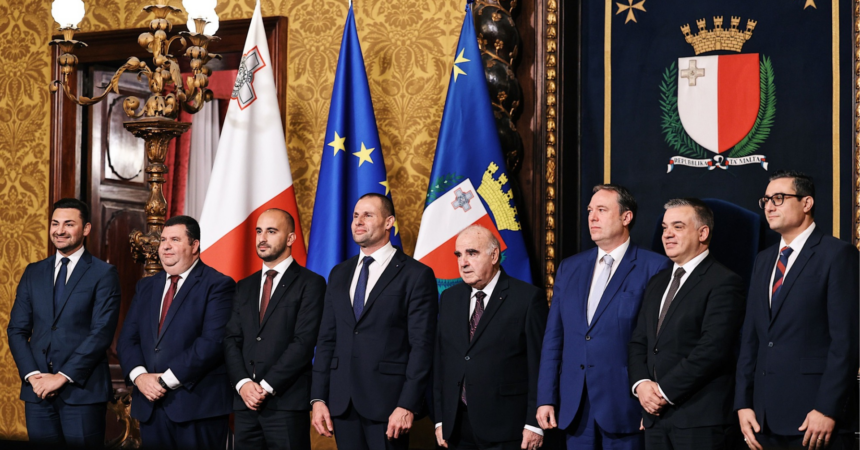Prime Minister Robert Abela’s cabinet reshuffle, unexpectedly announced on Saturday, is estimated to cost at least an additional €1.5 million per year in salaries to cater for roles added to the government’s already inflated cabinet.
According to estimates derived from budgetary allowances, the new cabinet, totalling 27 ministers and parliamentary secretaries up from the previous 24, is expected to cost north of €21 million per year when considering the payments and allowances given to ministers and their staff.
The new cabinet now totals 19 ministers and eight parliamentary secretaries (including the prime minister), far surpassing other EU member states per capita, such as the most populous member, Germany, which has a 17-person cabinet.
Estimates based on official cabinet budgetary allowances for 2022 show that a ministry costs taxpayers around €900,000 annually, while parliamentary secretaries cost around €500,000 annually.
The estimate, based on a cabinet manual stipulating ministry rules, is for salary costs and does not include costs for office rent and utilities, nor does it include expenditure on the salaries of additional persons engaged through consultancies.
New cabinet members include Malcolm Paul Agius Galea as parliamentary secretary for the elderly, Omar Farrugia as parliamentary secretary for public works and Glenn Bedingfield as parliamentary secretary for cleansing.
Another cabinet newcomer, MP Chris Bonett, was appointed as minister for transport and infrastructure, replacing Aaron Farrugia, who has been removed by Prime Minister Robert Abela.
An inflated cabinet by every measure
Following Abela’s new appointments, almost two-thirds of the Labour Party’s 43-person parliamentary group will have been given an executive position in government.
Despite its small size, Malta’s new administration is significantly larger than that of the German, Belgian, Danish, Irish, and Portuguese governments.
The issue is also present in parliament, which has 79 MPs, one for every 6,500 residents, or a rate of 15.2 per 100,000, far more than any other EU member state when considering Malta’s population.
On average, parliaments in the 27 EU member states have less than one MP per 100,000 residents. Although the situation in small member states is not expected to be proportional to the larger countries, the size of the Maltese parliament and cabinet remains inflated.













HAQQUX GLENN li tah ghax jixraqlu seg par tal KENNIESA U TAL LATRINI
PROSIT ROBERT
Aaron Farrugia was kicked out because he was not corrupt ,because he did nothing wrong, only the same stupidities his predecessors did. But it seems he was cleaning TM and was stepping on sensible toes. So off he went. Now TM have the minister who took his family for a joy ride in sicily in a government Ministers car. Abela wants crooks around him. Seems Aaron did not qualify
Malta has become a corrupt party vanity project – a ‘pimp my ideology’ trash-television, tax-fuelled, fevered recurring nightmare which never ends and from which the majority of citizens refuse to be shaken out of. GHUA.
‘The issue is also present in parliament, which has 79 MPs, one for every 6,500 residents, or a rate of 15.2 per 100,000, far more than any other EU member state when considering Malta’s population.’
In my uneducated opinion, this is Malta’s strength. Higher granularity in representation, as in there is much more chance that a parliament should be able to hear what the people complain about, with much more detail (note I used ‘should’).
However, the first issue I find with my opinion is that I don’t know which 6500 should correspond to which minister, obviously taking that statistic at numerical value.
Shameful then they have no money for medicines for the sick. Gobble along